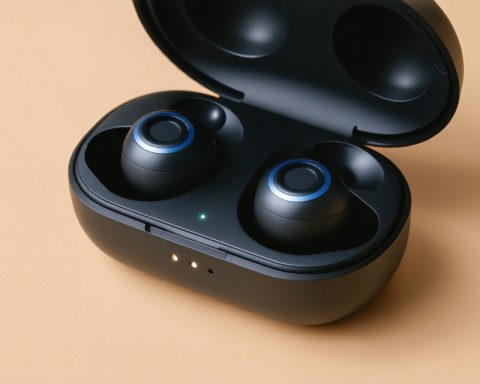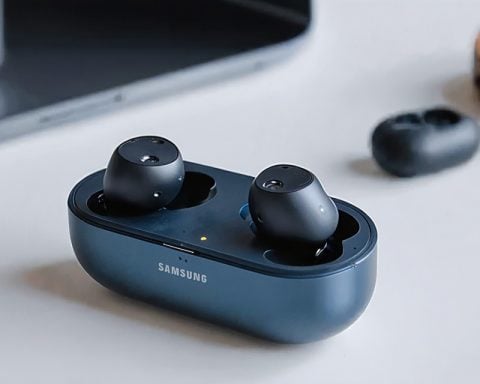- Aliro is a new communication protocol that revolutionizes smart locks by using smartphones and smartwatches for access.
- The protocol supports NFC, Bluetooth LE, and UWB for flexible digital entry systems.
- Aliro prioritizes simplicity, flexibility, security, and interoperability in smart home integration.
- Major industry players like Apple, Google, and Samsung support the Aliro initiative.
- Google introduces Aliro through Play services, enhancing Google Wallet compatibility with NFC readers in Android and Wear OS.
- The shift towards Aliro could render traditional keys obsolete, emphasizing secure and convenient digital access.
Imagine a world where your smartphone or smartwatch is your house key, seamlessly unlocking doors with just a tap or a wave. That vision is becoming reality as the Connectivity Standards Alliance unveils Aliro—a groundbreaking communication protocol set to redefine how we interact with smart locks.
In a November 2023 revelation, Aliro’s introduction is poised to revolutionize home security and accessibility. At the core of this innovation lies a standardized communication protocol that connects access readers—like smart locks—with user devices such as smartphones and smartwatches. With the potential to use Near Field Communication (NFC), Bluetooth Low-Energy (LE), and Ultra-Wideband (UWB), Aliro promises unprecedented ease in digital entry systems.
Four pillars define Aliro:
Simplicity reigns supreme, minimizing complexity to facilitate seamless integration of the protocol into existing systems. Imagine troubleshooting becoming a distant memory as systems work effortlessly together.
Flexibility shines by accommodating a wide array of installations and architectures, empowering users to manage both communal and individual access points conveniently.
In an age where security is paramount, Aliro offers a robust foundation for secure and trustworthy mobile access solutions, ensuring your digital keys remain just as safe as their traditional counterparts.
Interoperability breaks the chain of proprietary constraints, fostering a harmonious ecosystem where devices from diverse manufacturers communicate flawlessly.
This ambitious venture garners support from titans like Allegion, Apple, ASSA ABLOY, Google, Infineon, Kastle Systems, Last Lock, NXP Semiconductors, Qualcomm, Samsung, and STMicroelectronics. A coalition of innovators poised to shape the future of smart access.
Marking its debut within the realm of Android phones and Wear OS, Google introduces Aliro support in version 25.11 of Play services, paving the path for Google Wallet to interact with NFC readers. A giant leap toward a world where homes recognize you by your digital footprint.
As exciting as this era may sound, the practical adoption of Aliro hangs in balance, contingent upon the rollout of compatible smart locks. While this new frontier awaits exploration, the collaboration between industry leaders promises a promising horizon for technology-driven convenience.
The broader implication? Aliro does more than simplify access; it heralds a future where digital interactions become second nature. Users can anticipate a time where the traditional key becomes an artifact, replaced by the swift, secure, and smart alternatives of tomorrow.
The key takeaway is clear: As Aliro gains traction, it opens doors—quite literally—to a realm where technology makes daily life more secure, convenient, and connected. Prepare to step into a world where your digital identity holds the keys to all your kingdom.
Unlocking the Future: How Aliro is Set to Transform Smart Access Worldwide
The advent of Aliro marks a significant milestone in the evolution of smart access technology, promising a seamless integration of connectivity and security in daily life. As Aliro rolls out its groundbreaking communication protocol, spearheaded by the Connectivity Standards Alliance, it stands to redefine how devices and users interact with entry systems across residential and commercial landscapes. Let’s delve deeper into what Aliro entails and its potential impact on the market.
Key Features and Specifications
– Standardized Protocol: Aliro leverages multiple connectivity technologies like NFC, Bluetooth LE, and Ultra-Wideband to ensure devices can communicate seamlessly.
– Enhanced Security: A robust encryption framework ensures that your digital keys are as secure as traditional keys, preventing unauthorized access and potential breaches.
– Interoperability and Flexibility: Aliro supports a diverse range of devices, allowing for integration across various manufacturers, from smartphones to smartwatches.
Real-World Use Cases
1. Residential Smart Homes: Transitioning to smart access can eliminate the need for physical keys, offering convenience and enhanced security for homeowners.
2. Commercial Buildings: Offices and businesses can benefit from streamlined access management, reducing administrative overhead and improving security protocols.
3. Hotels and Hospitality: Streamlined check-in processes can enhance guest experiences, where room access can be managed digitally via their personal devices.
Market Forecasts and Industry Trends
– Smart Lock Industry Growth: Allied Market Research predicts the global smart lock market will reach $4.4 billion by 2027, bolstered by protocols like Aliro enhancing compatibility and security features.
– Increased Adoption of IoT Devices: With the proliferation of IoT, Aliro can accelerate the adoption of smart home devices aimed at creating interconnected living environments.
Controversies and Limitations
– Adoption Challenges: The adoption of Aliro depends heavily on the rollout of compatible smart locks and their acceptance by consumers who still rely on traditional security measures.
– Privacy Concerns: With enhanced connectivity, maintaining user privacy and preventing data exploitation remains a key challenge that needs addressing.
Key Players Supporting Aliro
Companies like Allegion, Apple, ASSA ABLOY, Google, Infineon, and Samsung are backing Aliro. Their involvement assures the quality and adoption of leading-edge smart technologies fostering industry-standard protocols.
Quick Tips for Users and Consumers
– Transition Gradually: Consider hybrid solutions that allow for both physical and digital access as you adapt to using smart locks.
– Stay Updated: As Aliro integrates more devices, ensure your smartphone’s firmware is updated to support the latest protocol capabilities.
– Prioritize Security: Pair your smart access solutions with reliable security measures to protect your digital keys from potential cyber threats.
In conclusion, Aliro stands at the forefront of bringing a connected, smart future to life—promising enhanced security, convenience, and industry harmony through its innovative protocol. As this technology expands, embracing the combination of convenience and security it offers will redefine daily interactions with our environments. For more on smart technologies and innovation, visit the Connectivity Standards Alliance. Prepare to unlock new dimensions of digital living.












